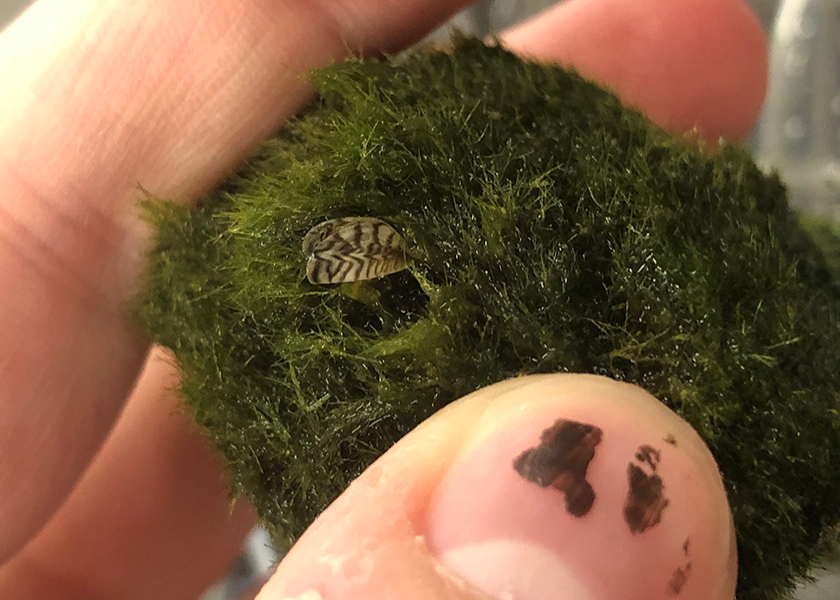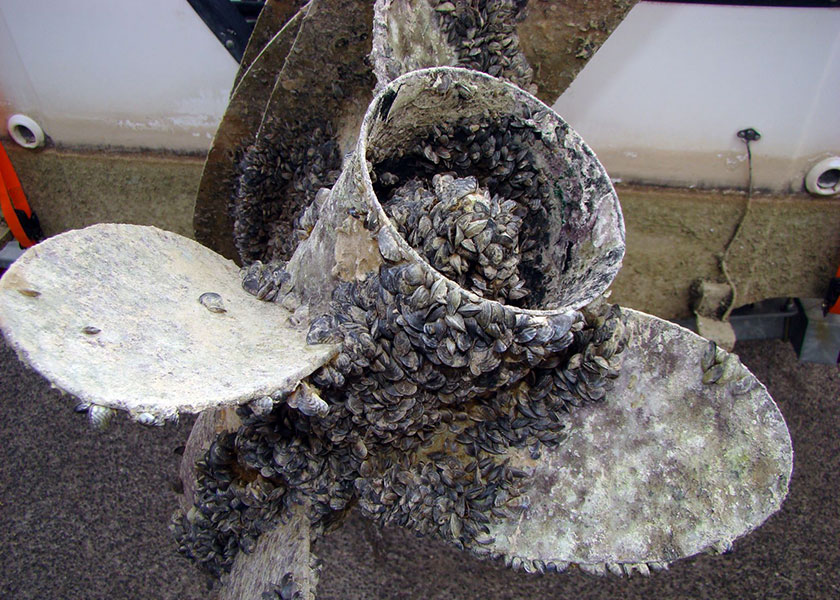Introduction
The California Department of Fish and Wildlife (CDFW) is asking retailers and consumers to help stop the spread of a dangerous invasive mussel that has been found in aquarium moss balls sold in California and nationwide.
CDFW was notified in early March 2021 that zebra mussels, highly invasive freshwater mussels which are illegal to possess in California, were found on aquatic moss balls at a national pet supply retailer. Investigators traced the origin of the mussel-contaminated moss balls to a distributor in southern California. CDFW’s Law Enforcement Division worked with the distributor to immediately cease outgoing shipments and prevent the receipt of additional importations. State and federal law enforcement agencies continue to investigate the potential supply chains associated with this product, and have since identified several additional suppliers to California and nationwide.
If zebra mussels escape from aquaria and into the environment, they pose the risk of causing enormous environmental and economic impacts. Once introduced to rivers, creeks, lakes, and canals, mussels multiply quickly, encrust surfaces, and disrupt ecosystems, water delivery systems, and recreational opportunities. It is imperative that pet suppliers and aquarists take action to prevent these mussels that have entered the aquarium trade from reaching our waterways.
California law prohibits possession, importation, shipment and release of zebra mussels in any waters within the state. Possession of zebra mussels in California, live or dead, and whether intentional or not, is a violation of California Fish and Game Code section 2301.
CDFW is calling upon pet supply retailers and home aquarium enthusiasts to prevent the spread of mussels from aquariums. Read the recall notice from PetSmart(opens in new tab). Read the recall notice from PetCo(opens in new tab).
 Zebra mussel found on a moss ball at an aquarium store. Photo courtesy Oregon Department of Fish and Wildlife.
Zebra mussel found on a moss ball at an aquarium store. Photo courtesy Oregon Department of Fish and Wildlife.
 Zebra and quagga mussels can clog boat propellers. CDFW photo
Zebra and quagga mussels can clog boat propellers. CDFW photo
What is an aquarium moss ball?
Aquarium moss balls are not moss but a green filamentous algae (Aegagropila linnaei) that looks like moss. They are soft and spongy when filled with water in aquariums and provide habitat for fish, shrimp, and other species. Moss balls can be purchased through national retail chains, small independent retailers, and online marketplaces. The moss ball itself is not invasive. (Information from USFWS(opens in new tab))
What are zebra mussels?
Zebra mussels are one of the most devastating invasive species in North America. When they become established in an environment, they alter food webs and change water chemistry, harming native fish, plants, and other aquatic life. They clog pipelines used for water filtration, render beaches unusable, and damage boats. These filter feeders outcompete other native species in infested rivers and lakes. The waste they produce accumulates and degrades the environment, using up oxygen, making the water acidic, and producing toxic byproducts. Zebra mussels have invaded one reservoir in California, while the closely-related quagga mussel is in a number of reservoirs. Learn more about zebra and quagga mussels in California(opens in new tab).
What should I do?
Do not dispose of the moss balls in drains, waterways, or gardens!
Retailers:
- Immediately pull moss balls from your shelves and store in a secure location until they can be destroyed. Also inspect all other moist and aquatic plant products. All moss balls, and any other products found to be contaminated with mussels, should be placed in a bag, frozen overnight, and disposed of in the municipal trash.
- Immediately inspect all fish tanks and filtration systems for mussels. If mussels are found cease sale of all products from those tanks. Remove all mussels and live plants, place in a bag, freeze overnight, and dispose of in the municipal trash. Clean and disinfect all aquaria, filters, and decorations.
Consumers: If you have added moss balls to your aquarium or fish bowl within the past year assume that you may have introduced zebra mussels and take one of the following actions:
- Alternative 1. If you observe mussels in your aquaria, per US Fish and Wildlife recommendations(opens in new tab), empty and disinfect the aquarium and all of its contents. Even if you do not observe mussels consider decontaminating your tank and all of its contents.
Considering the significant investments many aquarists make in establishing and maintaining their aquaria, disinfecting and reestablishing a system in which mussels have not been observed may not be a realistic expectation. Consistent with steps necessary to prevent the release of zebra mussels, should they be present;
- Alternative 2. Quarantine and monitor your aquarium for at least 6 months.
- Any live plants removed from the tank should be frozen and disposed, and not traded or sold to other aquarists.
- Animals from the tank should not be sold or traded.
- The tank and all contents (decorations, filters, gravel) should be disinfected before selling or trading.
- The tank should be closely inspected once a week for mussels. If mussels are found they should be removed, frozen, and disposed of in the municipal trash. Please report this to Invasive Species Program biologists to help us understand the suitability of aquaria; not for enforcement purposes.
- Use this aquarium monitoring log (PDF)(opens in new tab) to assist you with inspections of your tanks. The quarantine would end 6 months after no mussels are found.
For additional information and guidance, contact the CDFW Invasive Species Hotline at invasives@wildlife.ca.gov or (866) 440-9530.
For more information